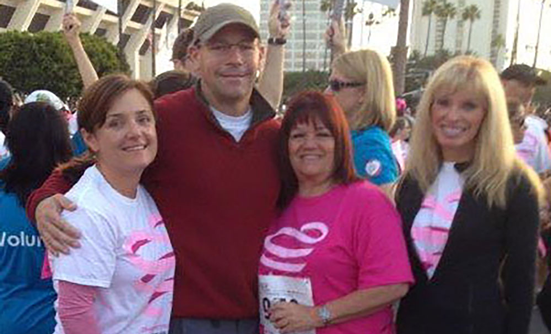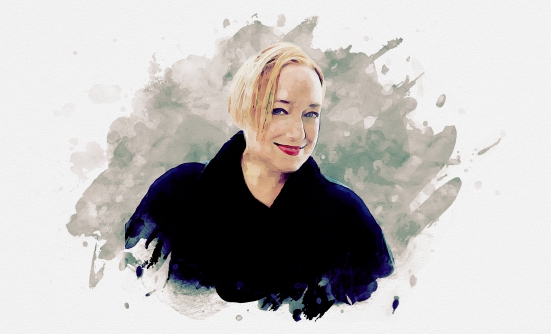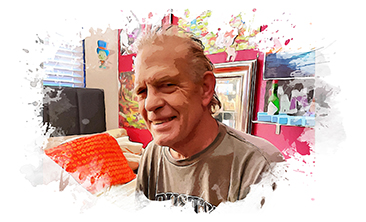CONQUER: Thank you for speaking with us. To start, when were you first diagnosed with breast cancer?
Ginger: August 2012.
CONQUER: I understand that you used acupuncture to help you deal with the pain after mastectomy. How did it help you? How did it turn things around for you?
Ginger: There was nerve damage. I actually had a lumpectomy, not a full mastectomy. They say there’s more nerve damage in the arm tissue when they do a lumpectomy. The pain I was having was severe.... I went back to my surgeon. He sent me to an orthopedic doctor. Of course, then they sent me to physical therapy.
After 6 weeks of physical therapy, I wasn’t getting any relief. I attend a women’s breast cancer support group. The nurse navigator there was the one who suggested acupuncture. I thought, “If it’s coming from the nurse, it must be OK.” I’d done acupuncture, years ago, for another situation. It’s really helped.
CONQUER: How long did you receive acupuncture?
Ginger: I still go for acupuncture for various things. Relief didn’t happen overnight. I did realize that there was some relief probably within the first 2 or 3 treatments.
CONQUER: That’s quick.
Ginger: Total time—I’d say it probably took about 3 or 4 months to really get rid of the pain. The acupuncture redirects the nerve signals.
CONQUER: You’re free of pain now, as a result of that?
Ginger: Yes.
CONQUER: That’s wonderful. Would you recommend acupuncture to other patients with cancer then?
Ginger: Absolutely. At the office that I go to, they specialize in cancer treatment. There’s a big, long list of all the things that acupuncture can help when you’re going through treatment, even with the nausea from chemotherapy, things like that. It’s a godsend.
CONQUER: Are there other things that have helped you deal with the side effects of cancer treatment? What kind of side effects did you experience, and how did you manage those?
Ginger: Physically, the big side effect was the pain in the arm/shoulder area, because they put me on an anticancer drug. It’s a hormone blocker. My breast cancer was hormone driven. Now they put you on a complete blocker to block whatever estrogen your body still makes, even after menopause. I’m 64.
CONQUER: Oh gosh.
Ginger: There are 3 drugs in the same category. I’m on the third one because the first 2 just knocked me for a loop. The biggest side effect is bone and joint pain. Again, acupuncture has helped with that. I do attend our women’s breast cancer support group. You learn a lot more at the support groups than you’ll ever hear from doctors, actually, because they don’t know...they haven’t been through it.
CONQUER: It’s the insider’s knowledge. You learn it firsthand.
Ginger: You do.
CONQUER: Do you have any other suggestions that would be helpful for patients who are undergoing cancer treatment—insider knowledge that you now possess? What would you share with other people who are going through a cancer treatment that maybe you didn’t know from the onset or that you found particularly helpful?
Ginger: You have to be careful what you read on the Internet, unless you’re going to a verified cancer site like breastcancer.org, in my case, or the Susan G. Komen breast cancer site.
If you start reading some of the self-help fixes on the Internet, it can get you into trouble because they’re not always on target, and it scares you. If it’s not documented, it scares you. You have to go to a reliable source.
CONQUER: Anything else?
Ginger: Just pace yourself. When you’re going through radiation treatment and chemotherapy, you have good days and bad days. You think, “Today I’m going to be OK,” and then you overdo and throw yourself back 2 days.
CONQUER: I think that a lot of people do that, with almost any illness. You have a good day, and you’re like, “Woohoo. I can do everything.” Then, all of a sudden, you’re reminded that that’s not quite the case yet.
Ginger: Yes, you pay for it. Also, communication with your doctors and your nurse navigators is important. If you’ve got a question, you’ve got to just put it out there and keep going until you find the answer, like I did with the arm pain. When I first went back to the surgeon, he looked at me like, “I didn’t do it.”
CONQUER: Theoretically, he did, but that’s beside the point.
Ginger: My thought was: I’m not here looking to put this on somebody. I’m looking for relief. What do I do?
CONQUER: Absolutely. Ginger, are you working now? Are you a navigator yourself?
Ginger: No, I’m not a navigator. I’m a realtor.
CONQUER: In general, how are you doing today?
Ginger: In general, I’m good. I’ve got a lot on my plate right now with home and work. I have to tell my family I can’t jump through as many hoops as I used to. That’s what I’m dealing with today.
CONQUER: I understand. Your overall health though is good? You seem to have everything managed well?
Ginger: Yes. I’m still seeing all my doctors every 6 months. Next year, on my next mammogram—if it comes back clear, they'll push me out to a year.
CONQUER: That’s wonderful. Where do you receive your treatments?
Ginger: At St. Joseph Mission Hospital in Mission Viejo, California. One thing that happens when you see your radiologist and all the staff on a daily basis for anywhere from 6 to 8 weeks is that when they cut back your treatments, you miss those people.
CONQUER: I’ve done physical therapy, and I felt the same way.
Ginger: You meet a lot of great people. This journey, it’s not a sorority that you would pledge to be in, but if you’re going to be in it, just open your mind and your heart and embrace everything that comes your way. I’ve met a really great group of people that I never would have met any other way.
CONQUER: Well, thank you for your time. We wish you success and continued good health.
Ginger: You’re welcome. It was my pleasure.















